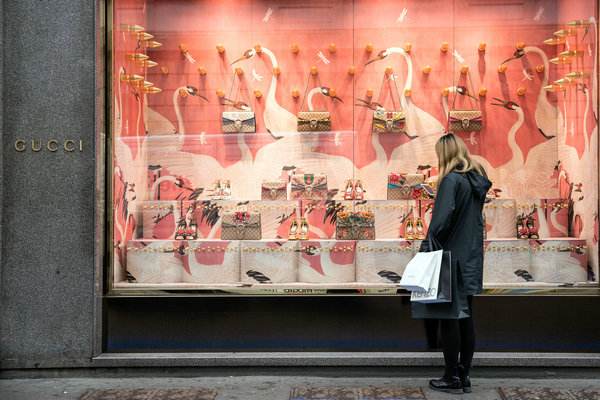 |
|
A pedestrian looks at the window display of a Gucci store in Milan, Italy.[Photo provided to China Daily] |
Internet generation has more debt and more awareness of other brands.
Seducing hyper-connected "Millennials" poses an increasing challenge for luxury brands, which find their markets slowing as young, skeptical consumers force them to rethink strategies.
Goldman Sachs estimates that 92 million Americans are in the Millennial generation-born between the early 1980s and the 2000s-surpassing the famed cohort of postwar Baby Boomers who are now approaching a geriatric phase.
The huge pool of Millennial consumers grew up with the internet, smartphones and a sharing economy in which owning things like cars is seen as almost unhip.
Studies show many have different expectations than their elders, who were relatively better paid and less indebted at the same point in life.
Deloitte analyst Nick Pope spoke last week at an FT Business of Luxury Summit of "a structural worry" as to whether there would be the "same level of spending in product ownership and luxury as there was in their parents' generation."
A Deloitte study targeted Millennials as an opportunity for luxury brands, but warned that they require "a high level of investment" and are more "mercurial" consumers whose brand loyalty can quickly shift.
"Their engagement with digital technology has exposed them to more sources of information, a greater range of influences, and smaller brands," the study says of Millennials.
"To attract, excite and engage Millennials will require a high level of brand investment."
Luxury-sector sales, excluding the effects of currency changes, were up only one percent last year, and similarly tepid growth is expected this year, according to global management consulting firm Bain & Company.
US jeweler Tiffany recently announced a disappointing financial forecast, and the maker of the well-known British Burberry trench coat has embarked on a money-saving plan.
Digital panacea?
"The people in the luxury space, they got very spoiled, because there was a market of people who consistently spent," Sarah Quinlan of MasterCard Advisors told AFP on the sidelines of the FT luxury summit in San Francisco.
"That market is no longer there."
|
|
|
|
|
|
|
|
